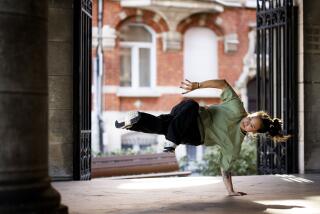GOODWILL GAMES : They Are Best Athletes Money Can’t Buy : Cuba: Things are changing in the communist world, except for this island in the Caribbean.
- Share via
SEATTLE — The more things change in international sports, the more they stay the same in Cuba.
For athletes from some communist--or formerly communist--countries, the Goodwill Games are more of an audition than a competition.
East German swimming and rowing coaches, fearful that there will not be enough jobs for them when their country reunifies with West Germany, openly advertise their availability. Some East German swimmers seek college scholarships in the United States.
While Yugoslavia’s best basketball player, Toni Kukoc, weighs offers from the Chicago Bulls and European teams, his teammates and Soviet players try to impress numerous NBA scouts. An equal number of NHL scouts worry Soviet ice hockey officials, who already on this trip have lost one player, Sergei Federov, to the Detroit Red Wings.
“I don’t care,” a deputy minister from the Soviet Sports Committee said when asked about Federov’s departure. Then, with a wink, he added, “It’s a free country.”
Recognizing the trend in other socialist countries to allow athletes to sign professional contracts, Cuban leader Fidel Castro recently said that his country’s baseball players are free to seek opportunities in the major leagues.
It is not unusual to see professional scouts behind home plate when Cuba plays, but Castro’s statement lured more than usual to the Goodwill Games. At least three players, third baseman Omar Linares, shortstop German Mesa and second baseman Antonio Pacheco, are believed to have the ability to play immediately in the majors.
“Everybody can leave,” said Coach Silvio Borges, whose team swept its five games, including the semifinal by 16-2 over the United States, to win the gold medal. “A baseball player can ask for a visa. It is for everybody.”
But even if Castro has altered his anti-professional policy, at least the one he offers for public consumption, scouts were disappointed when the players reacted to questions about playing in the United States with the same disinterest that they did in the past. They continue to promote a revolution that occurred 10 years before many of them were born.
“In the case of the players here, we’re not tied down,” first baseman Orestes Kindelan said. “But we love our country. We play baseball because we like it. We don’t want to feel like a piece of merchandise.”
Echoed Linares, “I will always play for Cuba.”
It is possible, of course, that the Cubans are less than candid in interviews.
U.S. quartermiler Rochelle Stevens said that Ana Fidelia Quirot of Cuba, Track & Field News’ female athlete of the year after she won the 400 and 800 at the 1989 World Cup, told her last week that she wants to retire.
“She told me she’s tired of competing,” Stevens said. “She told me she wants to have a baby, but the (Cuban sports committee) won’t let her because she’s their best runner. She has no choice but to run because Cuba is a communist country.”
In a news conference, Quirot denied that she spoke of such things to Stevens.
She also said that Cuba will not be influenced either politically or athletically by changes in other socialist countries.
“No one will cause us to change,” she said. “We will defend socialism to the death.”
No Cuban athlete here has attracted more attention than heavyweight Felix Savon, who was inspired to become a boxer by his renowned countryman, three-time Olympic champion Teofilo Stevenson.
One reason that Savon, 22, has received so much attention at the Goodwill Games is because he has not received any attention at the Summer Olympics. In 1988, when he would have been favored to win the gold medal, Cuba boycotted.
A headline last week in the Seattle Post-Intelligencer called Savon, “The Best Boxer You’ve Never Seen.”
Now that boxing fans here have seen the 6-4, 201-pound Savon, they might not believe he belongs in the ring with Mike Tyson. But they probably would have said the same thing about Buster Douglas.
Savon’s critics contend that he is a puncher instead of a boxer who is not satisfied with a decision, risking losses by going after knockouts even when he is far ahead on points. Perhaps that is the reason his record is a mere 217-9.
He won the World Cup in 1985, world championships in ’86 and ’89 and will fight in the Goodwill Games final Saturday at the Seattle Center Coliseum. He won his semifinal bout Wednesday night over the Soviet Union’s Viktor Akshonov in a unanimous decision, the same result that allowed Savon to advance beyond his opening fight against Javier Alvarez of Texas.
Of seven Cuban boxers who began the competition, Savon is one of only three who has not lost. He said his teammates were beaten only by politics.
“They’re not beating us on quality and technique,” he said Wednesday. “It’s simply the decisions. In this situation, it seems to be the world against Cuba. But Cuba feels stronger than ever at this moment from a political point of view.”
Roosevelt Sanders, a U.S. coach, said Savon would be ranked between fifth and 10th in the heavyweight division if he turned pro.
Savon, who lives near the U.S. Navy base in Guantanamo, sounds like his hero, Stevenson.
When questioned about whether he would like to fight professionally, he reacted as if he had been asked to dive off the Space Needle.
“Since 1974, Cuba has been the king of amateur boxing in the world,” he said. “That is why the press all over the world asks us why we don’t box professionally.”
So why?
“Professionalism abolishes humanity and society,” he said.
Otherwise, he probably has no complaints with it.
More to Read
Sign up for Essential California
The most important California stories and recommendations in your inbox every morning.
You may occasionally receive promotional content from the Los Angeles Times.













